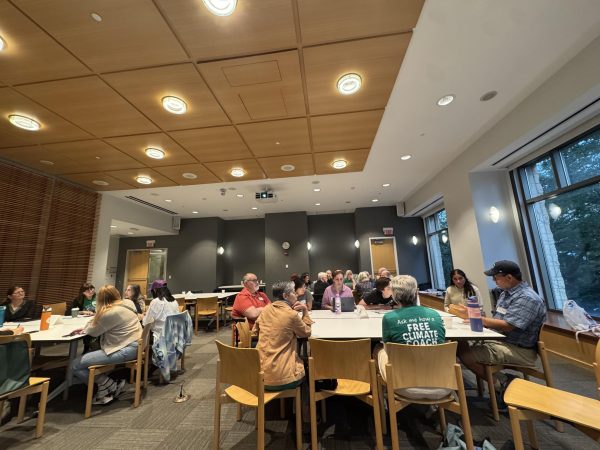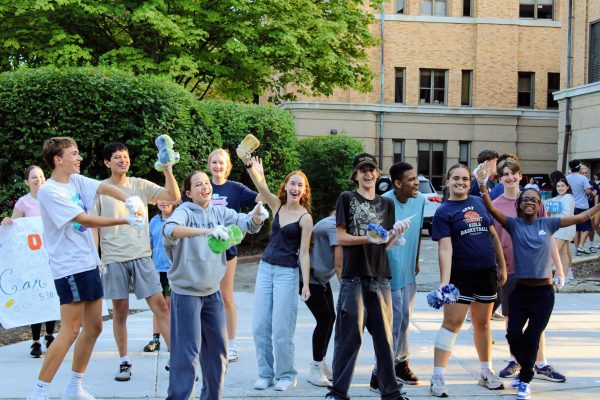“Otherness” and social isolation: causes and solutions
It is time again for a gathering of the Olson family. A row of people are spread across the couch at the residence of the Olson children’s grandparents. They each take turns chastising and commending American politics, one comment pouncing on top of the next.
All but one Olson is present in the living room: 15-year-old OPRF sophomore, Ella. Outside, the thump of the volleyball against Ella’s hands, the slight pause as it flies through the air, and then the second thump of the ball slamming against the outer wall is clearly audible over the quiet chatter in the living room. Thump. Pause. Thump. Pause.
In Olson’s case, otherness can be brought on unintentionally and is not always caused by negative responses.
“My cousins are always acting so much more mature than me,” she says. “I want to go outside and play sports (whenever we are at my grandparents’ house), but they just want to sit inside and talk politics, and that makes me feel really lonely sometimes.”
Whenever Olson experiences this feeling, however, she finds a simple solution: listening to her favorite song.
“The message of (the song) ‘Follow Your Arrow’ by Kacey Musgraves is to be yourself, don’t listen to what other people say about you,” Olson says. “It always helps me feel (less lonely).”
While Olson finds herself separated from her peers because of her interests, sophomore cross country and track runner Samantha Duwe has felt isolation due to her decreased physical capacity, sidelined from racing by head and neck injuries. Oftentimes Duwe feels frustration because of her inability to participate, but with the right guidance, she has learned how to overcome her frustration.

Sophomore track team member Samantha Duwe, prior to her sideline-causing injury.
“One of my favorite books is written by Deena Kastor, who has experienced lots of injuries throughout her running career,” Duwe said. “Knowing that others have experienced the same thing and having the support of coaches and teammates reminds me (that) I am not alone in this process.”
While Duwe and Olson reshape their thinking by following the lead of another, many victims of bullying suffer because another is in control, shaping their thinking through negative influence.
A study conducted by the National Center for Education Statistics, the primary federal institution for collecting and analyzing data on education in the United States, found during the 2017 school year, about 20 percent of 77.2 million students reported being bullied at school. Thirteen percent reported being the subject of rumors; 13 percent reported being made fun of, called names, or insulted; 5 percent reported being intentionally pushed, shoved, tripped, or spat upon; and 5 percent reported being excluded from activities on purpose.
An OPRF social worker who has requested anonymity emphasizes bullying and its subsequent generation of problems on a larger scale. “The most common problem (that) people come to me every day with is anxiety and/or depression,” she says. When asked what the number one cause of these problems are, she said with utmost confidence: “Social media.”
“Cyberbullying exposes teens’ personal issues to the public, and that generates more pressure for them to create a ‘perfect life’ for themselves on different platforms (which in turn can lead to anxiety or depression or both),” she said. She also said teens need to “unplug” and spend more time outdoors.
It is not just social media leading to these issues. The verbal and physical bullying 20 percent of students reported also plays a large role in increasing number of anxious and/or depressed teens.
A study conducted by Andre Sourander, a professor of child psychiatry at the University of Turku in Finland, followed more than 5,000 schoolchildren in search of a connection between bullying and mental health disorders. The study found children bullied frequently are two times more likely than children who are not to develop a psychiatric disorder requiring treatment as a young adult.
As the OPRF social worker said, “unplugging” and spending more time outdoors are possible coping mechanisms for bullying. Colleen Ponicki, an OPRF sophomore, said it also helps to speak to a trusted adult.
“I usually talk to my mom,” she said. “I feel comfortable talking to her because (she is) a really good listener.”





